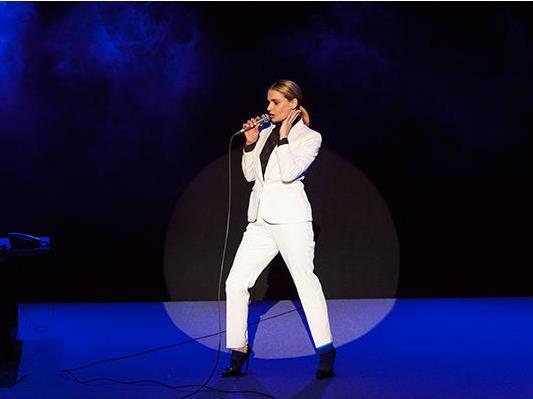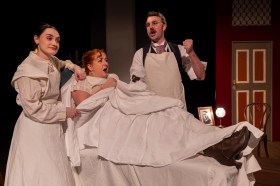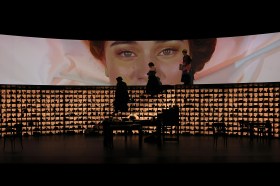Image: supplied
In the world of finance, boys will be boys and the only women in sight are strippers. It’s a world ruled by ambition and judged by the privileged, where male aggression runs rampant and unchecked. Astrid Wentworth (Danielle Cormack) is both an anomaly and a perfect product of this world. The only female broker in the building, she talks faster and plays harder than any of the boys. She is ruthless, but she is also winding down. She seeks a lover, and when she takes a young, ambitious broker Priya (Sophia Roberts) under her wing, the cracks of middle-age begin to appear. This is the story of what happens when the woman who worked so hard to be one of the boys tries to grow up.
This production has been blessed by a stellar cast. Cormack swaggers with that irresistible combination of sexuality and power that has always been the domain of men. Supports are similarly fantastic. Tina Bursills’ Arthur is eerily stoic. Sophia Roberts’ is empathetic as the naive underdog Priya, and Meredith Penman’s cool and knowing Isabelle makes femininity something to aspire to. Zindzi Okenyo as the bumbling Harrison gives an enjoyable comic relief. Opening night performances were a little jittery, but this is easily overlooked given the collective energy achieved by this particular ensemble.
Costumes, although enjoyable (who doesn’t love a sparkly leotard), are a little confusing. In a production with largely male characters played by an all-female cast, costume becomes all the more important in defining gender, so why then were the male characters dressed in suits with stilettos? These were not women dressed as men, they were women dressed as women who dress like men, like two mirrors reflecting into each other such that we lose sight of the actual object. If this was meant to be an ironic statement, the irony was lost in the reflections.
The dialogue is razor-sharp and full of snappy one-liners, but the overall structure was less finessed. The top two thirds of the production starts to lag as we walk through way too much exposition. The interspersing of musical and cabaret interludes, which fail to progress the story and go on too long, doesn’t help. Given the contemporary style of the production, the decision to utilise music from the 50s and 60s is also baffling and creates disengagement between story and style. The pace picks up again in the last third when the major conflict, the rape of Priya takes place, however it is wrapped up all too quickly, Priya’s fate is told via Astrid’s dialogue and hence, the audience is robbed of the opportunity to see those events unfold for themselves.
Much is made of Priya’s Asian-ess, however racial dynamics are not explored in depth. On a visceral level, why cast a white performer to play a Bangladeshi character if this is an important component of her character? Mildly offensive? Sure. If this was a token attempt to encourage diversity in the arts, the gesture is undone by the lack of effort taken to seek out a Bangladeshi performer. More to the point, it adds to the overall confusion, another reflection of a reflection where meaning is lost. Not that Roberts doesn’t give an outstanding performance, it’s just not a Bangladeshi one, hence why make a point of a topic that is not explored in story or performance.
The relationships between men and women are entertaining to observe, but what is more intriguing are the relationships between women and women. Astrid and Isabelle’s’ relationship is heartbreakingly pathetic and sensitively explored, but Astrid and Priya’s betrayal of each other could have done with more time. In response to Astrid’s perceived betrayal, Priya retaliates by forming an allegiance with her rapists in order to destroy her former mentor. The significance of this is rushed through: the lack of cohesiveness between fellow women in a man’s world, to the extent that women would side with their attackers against other women, is a depressing thought. Men are a predictable threat to women, but women who behave like men are doubly so. It’s the dark side of feminism that is infinitely more difficult to navigate, and this production comes very close, but flinches and looks away at the last minute.
Despite being a little undercooked in some areas, Boys Will Be Boys is nevertheless an entertaining, comic and brilliantly performed production with plenty of food for thought. It’s far from the whole conversation, but it’s definitely the beginnings of an interesting one.
Boys will be Boys
Sydney Theatre CompanyWharf 2 Theatre
Director: Paige Rattray
Designer: David Fleischer
Lighting Designer: Ross Graham
Composer, Sound Designer & Musical Director: Kelly Ryall
Choreographer: Kurt Phelan
Cast: Tina Bursill, Danielle Cormack, Zindzi Okenyo, Meredith Penman, Sophia Roberts
16 April – 16 May, 2015





